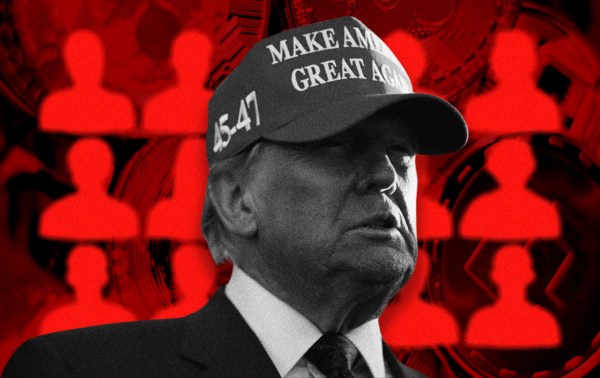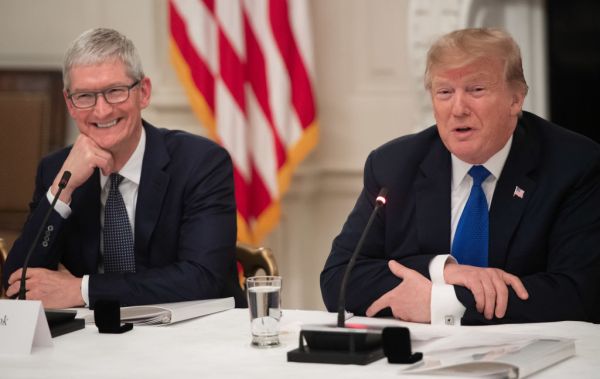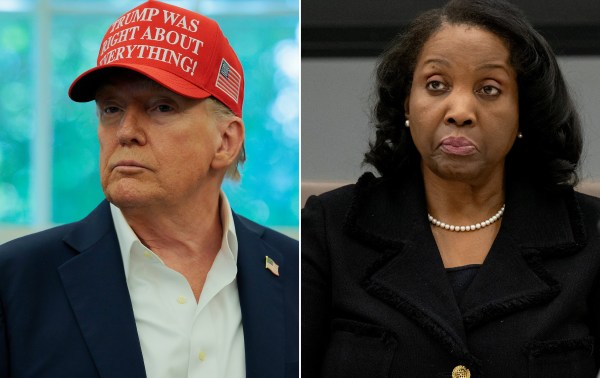There’s a shake-up happening on K Street, one of Washington, D.C.’s busiest corridors and a long-standing metonym for the city’s influence industry. For decades, the lobbying sector has been dominated by large and long-established law firms like Brownstein Hyatt Farber Schreck, Akin Gump, and Holland & Knight and consultants like Cornerstone Government Affairs that have collectively raked in billions of dollars in lobbying revenue. Since 2015, in fact, no firm has managed to bring in more lobbying revenue than either Brownstein or Akin in any given year.
That may change in 2025. As the Trump administration continues to upend the political status quo, a new crop of firms are leveraging their close ties to the administration to remake the lobbying industry.
In the second quarter of this year, Ballard Partners, a Florida-based lobbying shop, rocketed to the top of industry revenue rankings, posting $20.6 million in revenue according to its lobbying disclosures—nearly five times its revenue from the same period in 2024. Ballard has gained dozens of high-profile clients in recent months and is quickly becoming the go-to destination for businesses and industry groups looking for access to, and guidance on, the Trump administration to make the case for their policy priorities.
Ballard isn’t the only lobbying group experiencing substantial growth. As more and more money floods the lobbying industry each year, a slate of other firms with ties to the Trump administration—including Miller Strategies, Mercury Public Affairs, Michael Best Strategies, Continental Strategy, Checkmate Government Relations, and CGCN Group—also are capitalizing on Washington’s shifting political currents to expand their client lists. Miller Strategies, for example, brought in almost twice as much in the first half of 2025 as it did during the entirety of 2024. Mercury Public Affairs has seen a similar jump—the firm had $6.5 million in revenue in the second quarter of 2025, more than double the $3 million it took in during the same period of 2024.
Access, access, access.
While the effectiveness of a lobbying firm is based on factors such as subject matter expertise and a deep knowledge of the policy-making process, the quick growth of firms with close ties to the Trump administration demonstrates the most important element: access to public officials and their staff. In the Trump White House, lobbyists who have relationships with the president’s closest aides, or with Trump himself, are in short supply—and high demand.
“What is drawing this new business is the undeniable relationship and connectivity to this administration,” said one lobbyist who spoke with The Dispatch on the condition of anonymity in order to discuss the industry frankly. Craig Holman, a lobbyist for the nonprofit advocacy organization Public Citizen, echoed the sentiment. “Access is the No. 1 criteria when it comes to the effectiveness of lobbyists. [Those firms] all have close ties to Trump, and they’re the ones pulling in all the business,” he said.
Ballard Partners, for example, is headed by Brian Ballard, a longtime Trump ally who led the 2016 campaign’s finance operations and was an important fundraiser for the president’s 2024 campaign. Ballard reportedly had a brief falling out with the president and his staff in March, but has since returned to the administration’s good graces. Several Trump administration officials, such as White House Chief of Staff Susie Wiles, Attorney General Pam Bondi, and Deputy Director of Presidential Personnel Trent Morse, worked for the firm as lobbyists before taking roles in the second Trump administration (which is not prohibited by law).
Other quick-growing firms have similarly close ties to the White House. Jeff Miller, founder and CEO of Miller Strategies, was the finance chair for Trump’s 2025 inauguration and a close confidant of former House Speaker Kevin McCarthy. Several principals at the firm, including former Deputy White House Counsel Stefan Passantino and former Special Assistant to the President Ashley Gunn, have also worked directly for Trump. At Mercury Public Affairs, Bryan Lanza—who served as a deputy communications director for Trump’s 2016 campaign—leads much of the firm’s White House lobbying efforts. Mercury also has close ties with Wiles, who was the firm’s co-chair from 2022 until 2024.
One Republican consultant who was granted anonymity to speak freely told The Dispatch that Trump has made his circle of trusted advisers smaller in his second White House than it was in his first. As a result, some lobbyists who had access to administration officials during Trump’s first term, and especially those who distanced themselves from him and his allies after the 2020 election, have struggled to break back into the president’s circle. “There’s very few people that they trust, and I think they’ve earned the right to not trust a lot of people,” the consultant told The Dispatch.
Another challenging aspect of lobbying the Trump administration, according to the lobbyist who spoke with The Dispatch, is just how centralized it is. In past administrations, like that of Joe Biden, the decision-making process within the executive branch was dispersed among more people than it has been during the second Trump term. Often, relationships with cabinet secretaries, agency officials, and key staff was just as or more important than relationships with the president himself. However, in today’s executive branch, a narrower group of people are making decisions and influencing policy. “I don’t think there’s any doubt that this administration is top down and West Wing-driven,” the lobbyist said. “Everything flows from there.” The existence of this tighter circle around Trump and narrower decision-making apparatus makes close connections with the president himself, and especially with influential advisers like Wiles, all the more important. Those connections are hard to come by, and the firms that have them are cashing in.
New issues.
At the same time, the administration has been far more active in implementing its agenda than many before it. Since taking office, Trump has issued nearly 200 executive orders, imposed high and far-reaching tariffs, dismantled executive agencies, and targeted law firms over their hiring practices and universities over antisemitism. Clients of lobbying firms are therefore paying more attention to the White House compared to Congress than in previous administrations. “There is an unprecedented level of activity and accomplishment. So the investment that companies, universities, and nonprofits are making in Washington is because of the incredible pace coming out of the administration,” the lobbyist said. “So that is why the firms with either the Trump credential or deeper Republican ties are seeing the greatest growth.”
Trump’s broad tariff strategy in particular has drawn new clients as both foreign and domestic industries seek to mitigate the negative effects that tariffs have on their bottom line. “Tariffs and trade are absolutely the biggest [new issue],” the lobbyist said. “It affects auto. It affects steel. It affects airlines. It affects pharma, biotech and medical devices. It affects everyone.”
Meanwhile, many universities have increased their lobbying efforts substantially as the Trump administration cracks down on what it terms “anti-Semitic harassment in schools and on university and college campuses,” and federal research grants are cut. In January, Harvard hired Ballard Partners on a $90,000-per-quarter retainer for “advocacy supporting education and educational research.” Vanderbilt University and the University of Washington also have retained the firm. Miller Strategies is the lobbyist of choice for Cornell, Johns Hopkins, and Northwestern universities.
Law firms—some of which already operate their own lobbying practices—are also seeking outside help to make their case to the administration. Both Kirkland & Ellis and Simpson Thatcher & Bartlett retained Ballard in March for “advice related to employment practices,” after the Equal Employment Opportunity Commission sent letters to 20 law firms informing them that their hiring practices may violate the law. Skadden, Arps, Slate, Meagher & Flom, another high-profile law firm, retained Miller Strategies in March for similar purposes. All three of the law firms eventually reached settlement deals with the administration.
Despite the broader focus on White House activity, Trump’s close relationship with Congressional leaders means that lobbying firms cannot overlook legislators in their influence efforts. “Because this administration, and the president specifically, has such a personal connection with Congressional leaders, you have to lobby both—working in a traditional way with Congressional leaders can be a very effective way of getting your message into the administration,” the lobbyist said. “At the end of the day, this town is still largely driven by Congress, and that is where the rubber meets the road.”
The reshuffle.
To K Street insiders, the shift towards Trump-linked lobbying firms is not only unsurprising, but expected. There are often significant pendulum swings when power in Washington shifts from one party to another. In 2021, during Biden’s first year in office, lobbying firms linked closely to the Democratic president also excelled. Putala Strategies, a firm run by former Biden aide Christopher Putala, saw its revenue jump from $1.2 million in 2020 to over $4 million in 2021, while Ricchetti Inc., a firm run by the brother of a top Biden adviser, nearly tripled its lobbying income over the same period.
Firms like Ballard Partners are, according to some, simply capitalizing on the same disruptions that occur whenever the White House flips. “Any time there’s a change in presidential administration, stakeholders will evaluate their advocacy efforts,” Justin Sayfie, a partner at Ballard Partners, told The Dispatch. “It’s not unusual for those stakeholders to adjust their advocacy teams accordingly.”
Similarly, firms with close ties to a president’s home state, like Ballard Partners and the many Floridians in the Trump administration, are often well-positioned to attract new clients. “You could say the same about Obama—I’m sure there were a bunch of Chicago people that really printed money then. With Biden, Delaware people did really nicely … every administration has people that are really tied to it,” the Republican consultant said. “That’s politics. That’s not Trump, that’s just life in politics.”
However, the degree to which the current lobbying landscape is being re-shuffled is notable. Firms with connections to a new administration almost always benefit from an influx of clients, but the speed at which firms like Ballard Partners and Miller Strategies are rising is remarkable, at least in recent history. “The truth is, we haven’t seen this kind of upheaval in the industry in 20 years,” the lobbyist said.










Please note that we at The Dispatch hold ourselves, our work, and our commenters to a higher standard than other places on the internet. We welcome comments that foster genuine debate or discussion—including comments critical of us or our work—but responses that include ad hominem attacks on fellow Dispatch members or are intended to stoke fear and anger may be moderated.
With your membership, you only have the ability to comment on The Morning Dispatch articles. Consider upgrading to join the conversation everywhere.